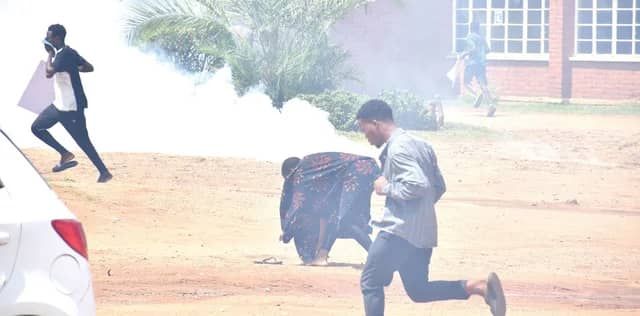By Burnett Munthali
Barely days after a group of panga-wielding individuals disrupted opposition-led demonstrations in Lilongwe, Malawi’s democracy was dealt another blow when masked individuals, allegedly in collaboration with Malawi Police Service (MPS) personnel, thwarted yet another anti-government protest yesterday. The demonstration, organized to highlight the worsening fuel scarcity in the country, was forcefully suppressed, raising serious concerns about the state of civil liberties, freedom of expression, and democracy in Malawi.
This disturbing trend is not only alarming but also a stark reminder of the dark days of political suppression and state-sponsored violence. It is crucial to interrogate the motives and implications of such acts, which are rapidly eroding the foundational principles of democracy.

The incident in Lilongwe was not an isolated occurrence. Recent weeks have seen a disturbing rise in coordinated efforts to silence dissent. Masked individuals, often armed and operating with impunity, have been disrupting opposition gatherings and public protests. While the government has distanced itself from these actions, the involvement of law enforcement agencies in yesterday’s incident strongly suggests otherwise.
Witnesses reported seeing police officers standing idly by or, worse, actively participating alongside the masked ruffians in dispersing protesters. This collusion underscores a chilling reality: the erosion of institutional independence in Malawi.
The Malawi Constitution guarantees citizens the right to assemble and express dissent. The deliberate disruption of these rights by state actors and their proxies is a gross violation of constitutional principles and a betrayal of the social contract between the government and its citizens.
At the heart of these protests is the worsening fuel crisis that has crippled the country. Long queues at petrol stations have become a common sight, disrupting daily life and paralyzing businesses. The scarcity is symptomatic of deeper governance and economic challenges that the administration of President Lazarus Chakwera has failed to address.
Protesters were seeking accountability and immediate action to resolve the crisis. However, instead of engaging with the grievances of its citizens, the government opted to suppress their voices. This approach not only undermines democratic governance but also risks further alienating an already frustrated populace.
The use of masked individuals to disrupt protests is a troubling return to vigilante-style politics. Historically, such tactics have been employed to intimidate political opponents and suppress dissent. The involvement of these groups raises serious questions about who funds and coordinates their activities.
Equally concerning is the message these actions send to ordinary citizens. When peaceful protests are met with violence, people are discouraged from exercising their democratic rights. This creates an environment of fear and silence, where critical voices are stifled, and accountability becomes elusive.
The complicity of the Malawi Police Service in these incidents is particularly disturbing. As an institution tasked with upholding law and order, the police must remain impartial and protect citizens’ rights. However, their apparent collusion with the masked groups tarnishes their credibility and erodes public trust.
This behavior also highlights the need for urgent police reform. A professional and independent police service is critical for safeguarding democracy and ensuring that the rule of law prevails. Without such reforms, the MPS risks becoming a tool for political repression rather than a protector of the people.
The events in Lilongwe should serve as a wake-up call for all Malawians. Democracy thrives on active participation, accountability, and the protection of fundamental rights. The suppression of dissent undermines these principles and threatens the country’s democratic fabric.
Civil society organizations, religious groups, and international partners must unite in condemning these actions and demand accountability from the government. President Chakwera’s administration must also demonstrate its commitment to democracy by distancing itself from these acts of suppression and taking decisive action against those responsible.
Additionally, the Malawi Human Rights Commission (MHRC) must investigate these incidents and hold perpetrators accountable. This includes identifying and prosecuting the masked individuals and any police officers who acted in violation of their mandate.
In conclusion, Malawi’s democracy is under siege. The collusion between panga-wielding groups and the police in disrupting peaceful protests represents a dangerous trend that must be halted immediately. Suppressing dissent will not solve the country’s problems—it will only deepen them.
The government must remember that power lies with the people, and the people’s voices must be heard. Addressing the fuel crisis, restoring trust in institutions, and protecting constitutional freedoms are the only sustainable paths forward. The alternative—a descent into authoritarianism—would be a tragic betrayal of Malawi’s democratic journey.
*About the Author*
Burnett Munthali is a political analyst and writer with a focus on governance, human rights, and democratic processes in Malawi.


